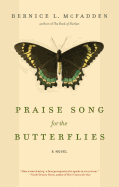
In Praise Song for the Butterflies, Bernice McFadden turns her keen eye to the subject of ritualistic slavery in West Africa.
Abeo Kata is nine years, seven months and three days old when her father takes her to a remote village in Ukemby and leaves her in the arms of strangers. "You should be honored to be here," she is told, "to become trokosi, to become wife of the gods." Abeo lives at the shrine for 15 years, witnessing unspeakable horrors and surviving horrific conditions before she is rescued.
McFadden (The Book of Harlan; Gathering of Waters) weaves past and present times to build Abeo's story, including the stories of her ancestors, which are crucial to understanding her father's actions. McFadden's writing is strongest in these moments, building a complicated and nuanced web of tales that reveal religious customs and cultural beliefs of a time and place that is both modern and yet rooted in the traditions of its past. As the novel evolves, more characters and plot threads are introduced--including that of Taylor, an American woman who is called to help the trokosi--and these can at times feel flat and cluttering. In the moments of brilliance, it is Abeo who emerges most fully on the pages: a fierce, vibrant and complicated woman whose survival shapes not only her life, but the lives of those around her.
At once a heartbreaking tale of violence and oppression and an uplifting story of hope and redemption, Praise Song of the Butterflies sheds light on the lasting legacy of ritual servitude in West Africa in way that is not easy to forget. --Kerry McHugh, blogger at Entomology of a Bookworm

